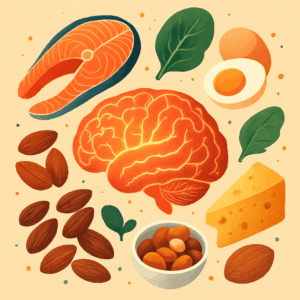The Role of Micronutrients in Mental Health: Tiny Nutrients, Big Impact
 When we think of mental health, we often focus on therapy, medication, and lifestyle changes like sleep or exercise. But one important—and sometimes overlooked—factor is nutrition. Our brain, just like the rest of the body, needs the right fuel to function well. Among these fuels, micronutrients (vitamins and minerals) play a crucial role in shaping mood, cognition, and resilience to stress.
When we think of mental health, we often focus on therapy, medication, and lifestyle changes like sleep or exercise. But one important—and sometimes overlooked—factor is nutrition. Our brain, just like the rest of the body, needs the right fuel to function well. Among these fuels, micronutrients (vitamins and minerals) play a crucial role in shaping mood, cognition, and resilience to stress.
🧠 Why Micronutrients Matter for the Brain
-
The brain is an energy-intensive organ, consuming about 20% of the body’s energy.
-
Micronutrients act as cofactors for enzymes, helping in neurotransmitter synthesis, myelin formation, and cellular repair.
-
Deficiencies can subtly, or sometimes dramatically, affect mental health.
🌿 Key Micronutrients and Their Mental Health Roles
1. Vitamin D
-
Regulates serotonin, dopamine, and norepinephrine.
-
Deficiency is linked to depression, anxiety, and cognitive decline.
2. Vitamin B12 (Cobalamin)
-
Essential for myelin, DNA synthesis, and neurotransmitter production.
-
Deficiency can cause fatigue, depression, memory problems, and even psychosis.
3. Folate (Vitamin B9)
-
Works with B12 in methylation pathways and serotonin synthesis.
-
Low folate levels are associated with treatment-resistant depression.
4. Iron
-
Required for dopamine and serotonin production.
-
Deficiency can cause fatigue, irritability, poor concentration, and depressive symptoms.
5. Zinc
-
Plays a role in brain plasticity and neurotransmission.
-
Deficiency is linked with depression, ADHD, and impaired learning.
6. Magnesium
-
Involved in NMDA receptor regulation and stress response.
-
Low magnesium is associated with anxiety, depression, and insomnia.
7. Omega-3 Fatty Acids (EPA & DHA) (not a micronutrient strictly, but essential)
-
Found in cell membranes of neurons, critical for communication.
-
Protective in depression, bipolar disorder, and cognitive decline.
8. Selenium
-
Functions as an antioxidant and supports thyroid health.
-
Low levels have been linked to low mood and anxiety.
💡 The Evidence
-
Research shows that multi-micronutrient supplementation can improve mood, reduce stress, and even benefit ADHD symptoms in some individuals.
-
However, supplementation works best in those with documented deficiencies—more is not always better.
✅ Practical Takeaways
-
Balanced Diet First: Focus on whole foods—vegetables, fruits, nuts, seeds, whole grains, eggs, dairy, fish, and lean meats.
-
Check for Deficiencies: Especially Vitamin D, B12, iron, and folate.
-
Targeted Supplementation: Take only what you need, under medical supervision.
-
Holistic Approach: Micronutrients are important, but they complement—not replace—therapy and medication when needed.
🌟 Key Message
Micronutrients may be small, but their impact on mental health is huge. A simple blood test and a balanced approach to diet and supplementation can go a long way in supporting emotional well-being and brain health.
✍️ Dr. Srinivas Rajkumar T
MD (Psychiatry), AIIMS New Delhi
Consultant Psychiatrist – Child, Adult & Geriatric Psychiatry
Apollo Clinic, Velachery, Chennai
📞 Contact/WhatsApp: 85951 55808